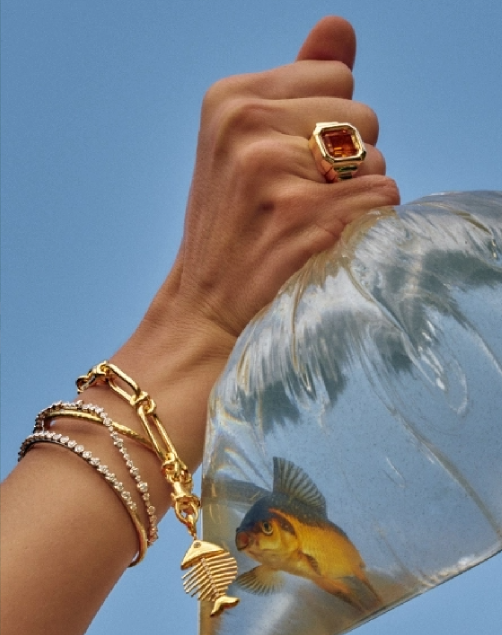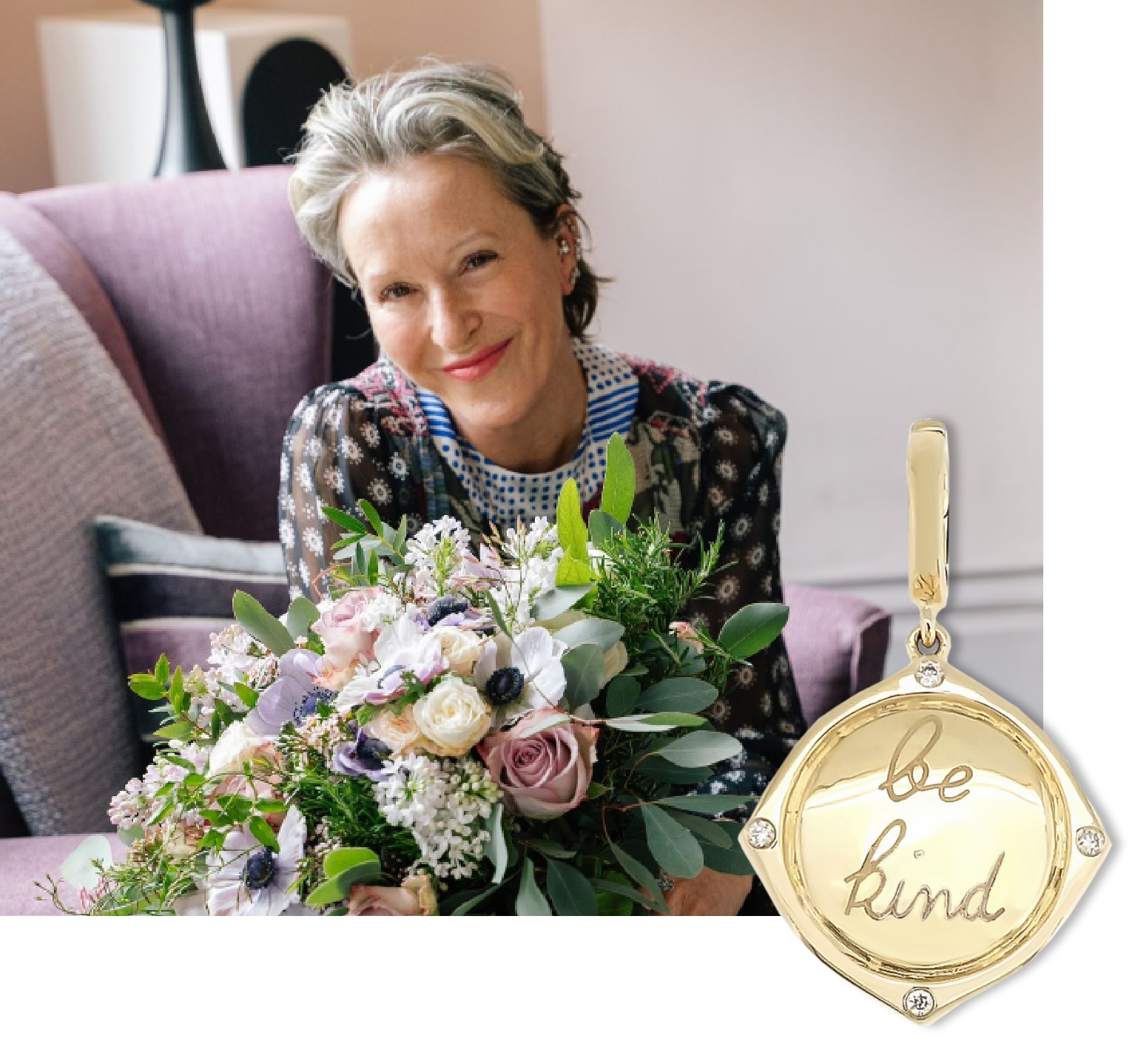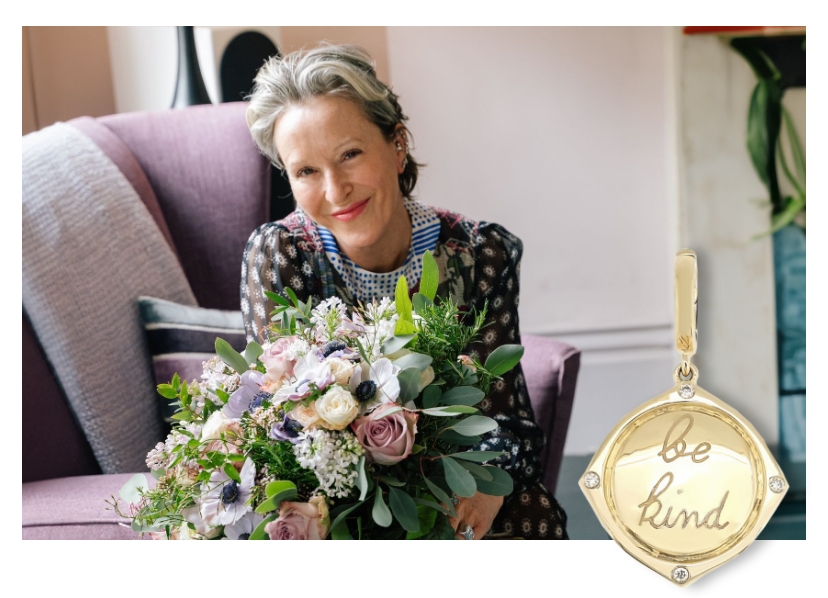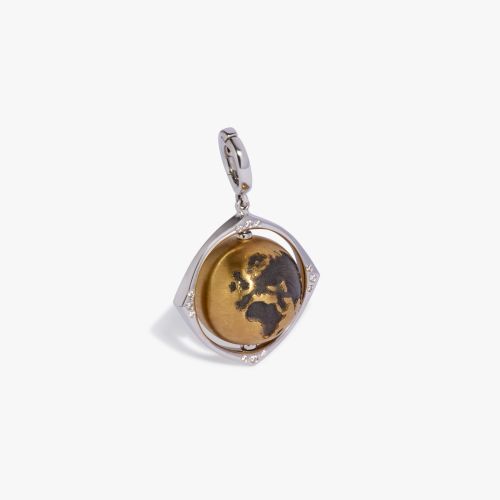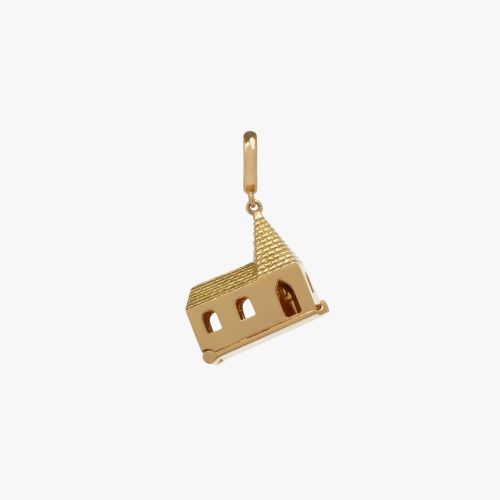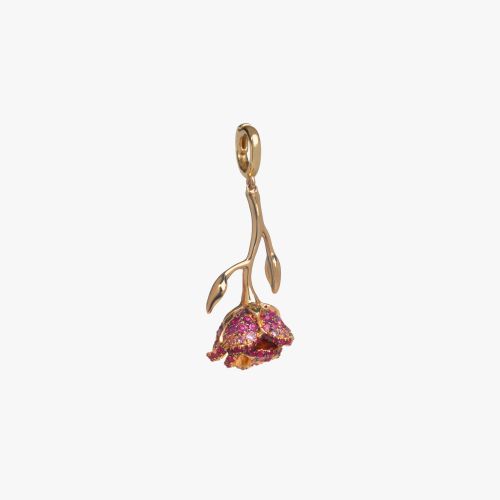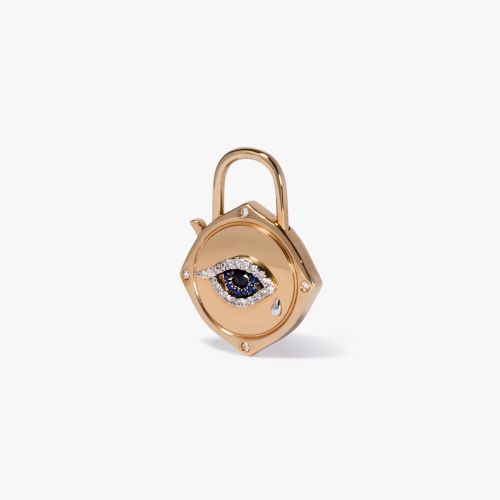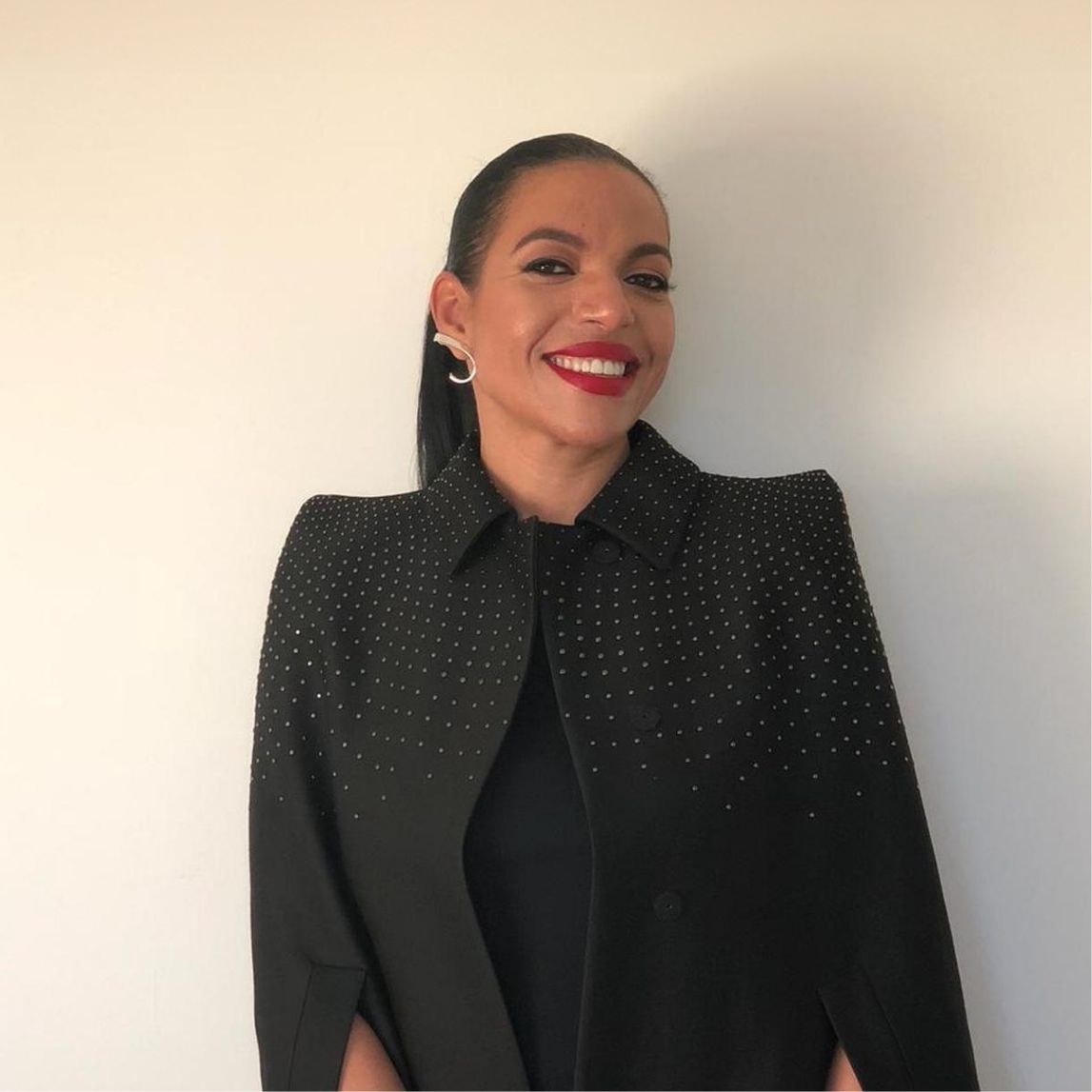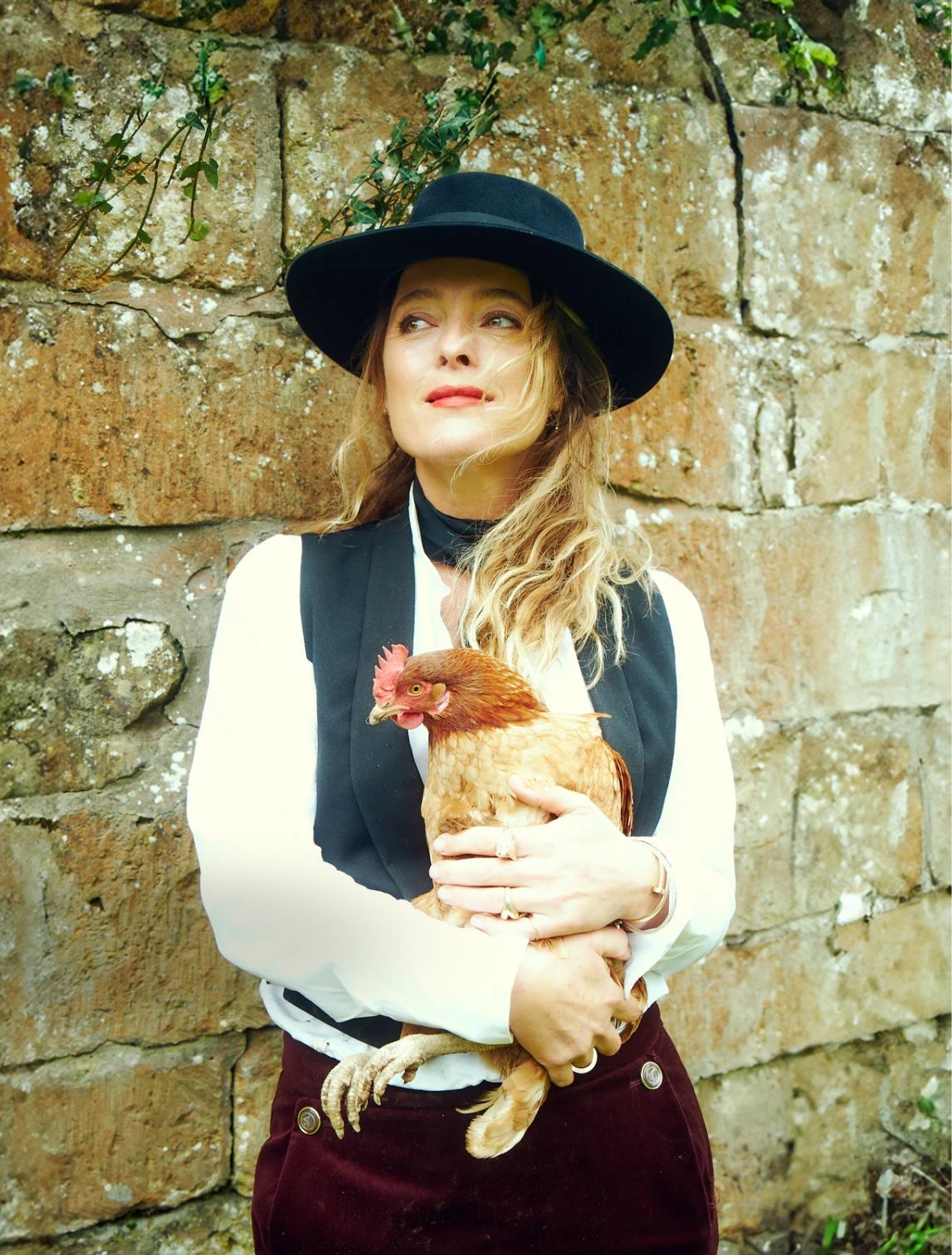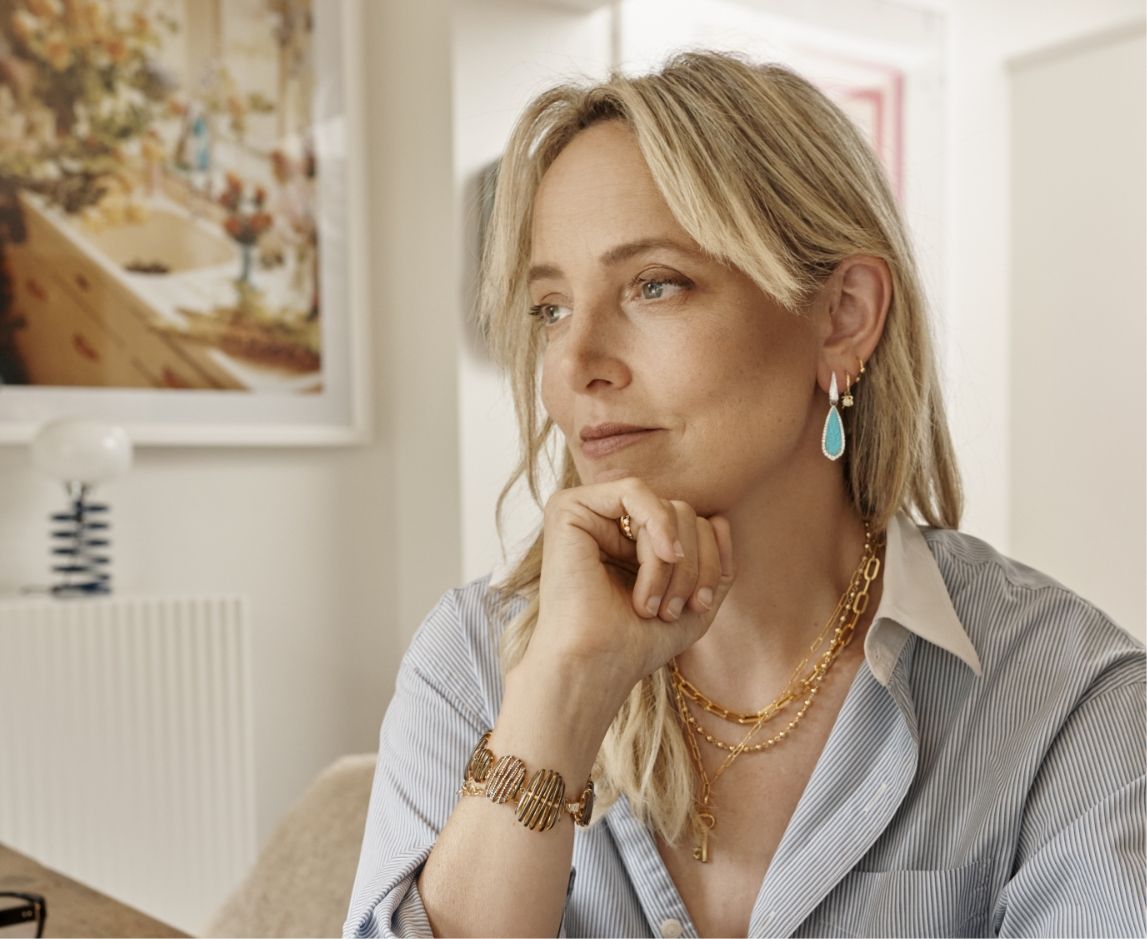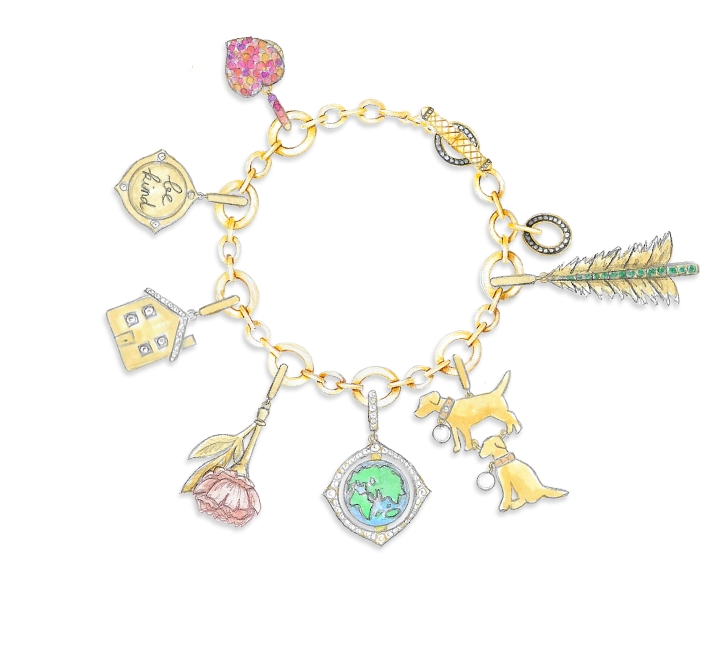

READ THE PODCAST
Annoushka Ducas:
Hi, Annoushka here. In this series, I'd really like to take the opportunity to tell you a little bit about The Brilliant Breakfast, an initiative that I set up two years ago to help the Princess Trust support disadvantaged young women. It really can be as simple as putting the kettle on and inviting a few friends around or hosting a breakfast for the team at work and asking everyone to give what they can to help change a girl's life. So that's The Brilliant Breakfast starting October the 10th this year. And for more details, visit thebrilliantbreakfastdoco.uk. Thank you.
I'm Annoushka Ducas, and welcome back to My Life in Seven Charms. For me, there are so few things which can evoke a memory like a tiny detailed In this new series, I'll be meeting seven extraordinary women and hearing their stories through this very special biography. Today's guest is one of my favorite florists, Nikki Tibbles.
Nikki Tibbles:
Being kind is probably the most important thing in my world. Again, it was something that my father taught me and he was an incredibly kind man. And I just wish the world was a kinder place.
Annoushka Ducas:
If you've ever received flowers from Nikki's business, Wild At Heart, they will have been strikingly lovely and superbly colorful. I'm so looking forward to hearing about Nikki's life in seven
Hello.
Nikki Tibbles:
This is exciting.
Annoushka Ducas:
So Nicki, thank you so much for coming to my loved little house.
Nikki Tibbles:
Thank you so much for having me. It's beautiful and I'm very honored to be here, so thank you.
Annoushka Ducas:
One of the things I love a bit about what you do, but is actually, if I hadn't been a jewelry designer, I'd want to be a florist.
Nikki Tibbles:
Would you?
Annoushka Ducas:
Yeah, and my dream, my real dream...
Nikki Tibbles:
Why?
Annoushka Ducas:
I'm going to talk to you about that separately. My real dream is to actually have a florist or something with my jewelry in it.
Nikki Tibbles:
Oh, that would be delicious.
Annoushka Ducas:
The two things together, wouldn't that be just .
Nikki Tibbles:
That would be great. Because the colors, the jewel colors of flowers and the pastels and the... It would just be such an extraordinary moment of color and texture and your passion.
Annoushka Ducas:
The two best things in the world are flowers and lovely jewelry.
Nikki Tibbles:
And a dog.
Annoushka Ducas:
Oh definitely, and a dog. I know we can talk about that. So Nikki, your first
was, you said, a multicolored heart. And I loved the fact that it's multicolored and you were quite specific that you should be brightly colored. So I've seen this as a three dimensional little heart, and I want to put it with pave set pink and orange
And I think we could have some rubies too because I know you like all those clashing colors.
Nikki Tibbles:
Yeah, I love
yes.
Annoushka Ducas:
So I've seen it as that. Set in
and polished yellow gold. And I've left the back plane so that you might be able to engrave somebody's name or something special to you. And it also opens. It's a little locket because I thought you could put a picture inside it of whatever you've chose.
Nikki Tibbles:
One of my dogs.
Annoushka Ducas:
One of your dogs, whatever you chose. But tell me about this heart. Why have you chosen a heart?
Nikki Tibbles:
Why have I chosen a heart? I think it's tied up with so many things in my life that are about being kind and wanting to make our world a better place. And if there was more love and kindness in our world, what a different place it would be. That is really one of the most important aspects of how I try and live my life. But I don't really have a family. So my friends are my family and that's my element of the love I have for people, and I have, as you know, a considerable amount of dogs and would have so many more. And the love that you have for animals and this planet is incredibly important to me. And that was really the passion and true love that is so incredible to feel and to have, and to want in our lives, is really why there's the element of the heart.
Annoushka Ducas:
And you don't have your own family now, but tell me a bit about your family growing up.
Nikki Tibbles:
I had the most incredible... I was very lucky to have two very wonderful parents. My father in particular, who I will be forever grateful for because he is the person that taught me my love of animals. He was a carpenter, he made beautiful things and I would sit in his workshop watching him work. And I remember the smells of the wood and the saw dust and all of those things. And the amount of passion and love that he put into everything that he created has remained with me. If we found a bird with a broken wing or back in those days when there were stray dogs on the street, I would come home regularly with a dog that I'd found or some animal that I had found somewhere.
Annoushka Ducas:
Where are you? Where were you brought up?
Nikki Tibbles:
I was in Bristol, just outside of Bristol. And through him that he's taught me my passion for animals. We had a house full of animals that my father would just lay down his life for. My mother was long suffering, sort of, "Not another dog, not another cat. No more rabbits." I remember finding the most beautiful German shepherd on the side of a motorway type thing and running home to my father. We got a blanket and we picked this dog up between us and put it in the car, took it to the vet. And this beautiful dog had obviously been dumped on the side of the road and she didn't live very long. We called her Wolfie, but she didn't live very long, but she had three very happy months with us after that.
But that's all thanks to my father for which I'm forever grateful and nature long walks. We'd go for amazing long walks in the countryside. And so with that and his passion for making things and his kindness. And also, he died quite some time ago now, he had pancreatic cancer. And when he passed away, my mother asked me what I wanted of his. And during the war, he was a prisoner of war and he wrote the most beautiful letters to my mother. And that's what I asked for as a gift because his love letters to my mother were so beautiful with the most beautiful handwriting.
People don't write like he wrote, and the way he expressed his love and depths and emotions for my mom, my mother. And really interesting moment also is that back then my father was prisoner war, so presumed missing an action. And so my mother was presented with a postal order and his tag or whatever it was and she sent it back saying, "He's not dead. I know he's still alive." And then of course they found him in a prisoner of war camp in Germany. And that's when he started writing, but she knew he was still with her. They met when they were 16.
Annoushka Ducas:
God, that's so romantic.
Nikki Tibbles:
Until they both passed away.
Annoushka Ducas:
That's wonderful. And would you say that your childhood was a happy one? It sounds like you spent lovely times with your father particularly.
Nikki Tibbles:
Did I have a happy childhood? Yes. I consider having a father like mine and an understanding mother who she's slightly trickier and that black is white and there was no swaying or movement from whatever it was that she thought. But I was very lucky, yes, because I did a lot of sport and I was encouraged to do that. And my parents, they met when they were 16 and they walked down the street hand in hand until my father died, and my mother died not long after probably of a broken heart. But I think just going back to the heart is, my parents were truly in love.
Annoushka Ducas:
They sounds so wonderfully romantic.
Nikki Tibbles:
They didn't do anything apart. And I always rather naively thought that there would always be this one person out there in the world that I would spend the rest of my life with. But that's sadly not happened yet,.
Annoushka Ducas:
That's quite a high bar. That is a very high bar too.
Nikki Tibbles:
I know, it is. And I think in the bigger picture, again, I feel very blessed because I know so many people whose marriages have clearly not worked and that it's children that suffer. So yes, I had a happy childhood. Thank you. Yeah.
Annoushka Ducas:
That sounds wonderful. But having come from such an unbelievably loving family, I feel you're never going to be able to replicate something so precious.
Nikki Tibbles:
Yes, it was precious. My father, he called me Nikks. He said, "Nikks, you can be anything that you want. You can do anything that you want.' And to have someone who has that much faith in you, or to have that ingrained in you, I do believe it. And if I do something, then I want to do my absolute best at everything and anything I do.
Annoushka Ducas:
Your second
is your favorite flower. And you said I'd like it to be a coral peony.
Nikki Tibbles:
Yes.
Annoushka Ducas:
So we'd have to do it in really pale orangy
like this, fading out. So we'd color grade it into perhaps yellow
which might be really pretty.
Nikki Tibbles:
That would sound very pretty.
Annoushka Ducas:
Again, a three dimensional set in yellow gold with a
textured leaf, same shape as the peonies. As perfect, a miniature of that giant peony that we could get.
Nikki Tibbles:
And this peony in particular, the reason why I love it so much is that it's completely different when it's freshly cut. But as it grows, it opens and it is gigantic. It's almost saucer like. It could fill a dinner plate, but it's so beautiful as it fades. And that's what I love about it.
Annoushka Ducas:
Okay. We have to look it up.
Nikki Tibbles:
And as it gets older, it gets more beautiful.
Annoushka Ducas:
That's what we should say about ourselves.
Nikki Tibbles:
I'm getting more beautiful as I get older.
Annoushka Ducas:
Let's go with that. But I assume that you've chosen this because obviously this is your world, flowers are your world. Now I've been longing to know how you started Wild At Heart. I've got lots and lots of questions actually about Wild At Heart, but tell me how you started and how it ever came to begin?
Nikki Tibbles:
It started quite randomly because I was working in advertising.
Annoushka Ducas:
Who was that for?
Nikki Tibbles:
I worked for various companies, Saatchi, Coport Bell, Davidson Pierce. So that was my career, so to speak. But I really wasn't very good at it and I really didn't enjoy it.
Annoushka Ducas:
Were you on the creative side of that?
Nikki Tibbles:
No, I was an account manager. But when I left university, my parents wanted me to be a teacher. I wanted to go to art school and they wouldn't let me, so yeah, thanks for that. My lovely parents I've been just talking about. But really I wanted to do something creative. So I started working in advertising and hated every second, but I met some amazing people. And I was asked because I was interested in fashion and buildings and architecture and art and so many different things and color and anything really, a friend of mine said, "Well, would you help me organize my wedding and do the flowers?" And I was like, "Yeah, of course, I'd love to." Having no idea, I trotted off to the flower market and didn't even know how to cut the flowers at that point before I put them in an arrangement.
Anyway, I really loved that moment. And then I did another friend's wedding and I managed to leave my not so heady career in advertising and I went to work in a flower shop on the Fullham Palace Road, I think. And I learnt about flowers because no florist at that point would take me because I had no experience. And I worked there for a little while and then I left and set up on my own and I contacted people that I'd used to work for that I knew. And I started doing flowers and I had a little studio in Southwerk. And then of course the Island, Turquoise Island, the famous Piers Gough building became...
Annoushka Ducas:
In Notting Hill?
Nikki Tibbles:
In Notting Hill, became available.
Annoushka Ducas:
Not everyone might know about this Turquoise Island. Right. So it was designed as a loo.
Nikki Tibbles:
It was designed as a public loo, yes.
Annoushka Ducas:
The whole thing?
Nikki Tibbles:
The whole thing. But the front of it was always going to be a flower kiosk, they called it because it's run by the Porto Bello Stall Holders Association or whatever of Kenson and Chelsea. So this is when my heady days of advertising came in useful. So I did this incredible proposal, mood boards, all the sort of thing I used to do when I was working in advertising. And it's 6:30, the following morning, I got a phone call saying, would I like to come in for an interview? And they had something like 76 applications or something for it. Anyway, I walked away with the keys and I opened the following week. And that's really how it all started.
Annoushka Ducas:
But had you been looking or was it just one of those things?
Nikki Tibbles:
No. Just one of those things and it just happened. And I had this incredible building and Notting Hill was amazing people. I mean, I remember Bernadette Rendall who was the head of PR for Chanel would come in and buy flowers and send to Hamish Bulls for example. And Rifat Ozbek lived around the corner. And there were wonderful people in Notting hill then, 20 plus years ago. And so I opened, and I'd never run a business before and certainly didn't really know that much about flowers, but I guess I'm the sort of person that I wear what I like, I don't really care what anyone else thinks. I'll put a pattern with a pattern and a stripe with a spot and a color and whatever. And I did the same with flowers. I put together the things I like and really, the business has grown from there.
Annoushka Ducas:
So that's quite brave to go and do that to take on the lease, to do something effectively. you'd never run a business before. It was pretty brave. Did you think it was brave or did you just think to yourself, "I'm just going to do it"?
Nikki Tibbles:
And maybe this goes back to the moment I was talking about my father's, I would never think anything would fail, so nothing will ever stop me from doing anything. And also, I guess I was so happy because I'd found my creative outlet, and through that I've met the most extraordinary people, worked on the most extraordinary events, seen the most beautiful buildings, created extraordinary moments where people are so happy. And the philosophy behind Wild At Heart is really this sort of sense of generosity through flowers, that again is something that's so important to me and that all ties back into the be kind and giving and all of those sort of things that I want people to open a bouquet or to receive a bouquet of flowers from us that takes your breath away through its sense of generosity rather than something that's going to last for three weeks.
Annoushka Ducas:
That's why I think flowers are jewelry are so along the same thing because when I'm creating a piece of jewelry, I just want that jewelry to make the person smile. So your reaction, it didn't make you cry, but I knew that was a really happy... I so get that. But Wild At Heart, just that name. How did you come up with it?
Nikki Tibbles:
Well, interestingly, I was actually sitting in my apartment at the time in Notting Hill and thinking of starting my own business. And it was back in the day when you had magazines. So I went through magazine after magazine and I'd tear sheets and tore out pages of images and words and things that I loved. And it kept coming back to Wild At Heart and the dagger for the movie and the heart because I also have a massive love of tattoos and the history of them and all those things. And that was really that image and those three words. And I always used to say, when I thought of a name for companies, I would pick up the phone and say, "Hello, Wild At Heart." And that had quite a nice ring to it.
Annoushka Ducas:
Yeah.
Nikki Tibbles:
And so that was really Wild At Heart and it was something very different because every other florist at the time and was their name. Steven Woodem and Jane Packer, Paula Prike, but they all had the... Constant Brie, Moisey Stevens, they all had their name. So I didn't want to have my name. I wanted words that meant something that would be memorable.
Annoushka Ducas:
And all those people that you've just mentioned because I was going to ask you this actually, in terms of what you were doing with the colors and putting things together that you love that perhaps weren't obvious, were they doing that too or was this a very particular Nikki thing?
Nikki Tibbles:
I think Jane Packer was probably one of the first to do something quite different. And also Paula Prike and Steven Woodem too, and John Carter. There were lots. And Julia Hodgkin, Howard Hodgkin's wife, she had the beautiful flower shop outside the Conran Shop, with the old fan. That was Julia's. So there were people making beautiful flowers, but I was never trained to put flowers together. So I think in a way that's why maybe we were a little bit different and we were wrapping things in brown paper with , and no one else had done that.
But it was really me doing what I like, which is really, I think the best thing to do. If someone asked me to do an event with red and white carnations, you're asking the wrong person. So it was just the perfect opportunity for me to work with something that is so beautiful. Nature is so inspiring. So I never get bored. I'm never bored. So it's the perfect, perfect thing for me.
Annoushka Ducas:
I so get that. But it's quite a competitive world it's become. I know so many young florists now. So what would be your advice to them? Because I'm just like, "God, how do you differentiate yourself? How do you stay ahead of the next young ones coming up?"
Nikki Tibbles:
There are a lot. There are a lot of florist around now and that's great because I think we, or the older generation of people who do flowers should be encouraging a younger generation to do something creative and inspiring. And so I think it's great that there are a lot of amazing young, talented florists out there. So yes, it actually makes me happy and a lot of them have worked with Wild At Heart. So I'm very proud of the girls that have gone off and set up their own business and are doing well.
Annoushka Ducas:
But does that mean that you have to keep evolving your business in order to...
Nikki Tibbles:
Yeah. But we should anyway, regardless. In lockdown, we completely rebranded. We were focusing a lot more on our online business. We're lucky enough that we have an amazing client list that come back to us time after time for events and parties and so on. But we do have to keep working very hard because it is very competitive and people do undercut us in price because obviously we are slightly more expensive than your averaged florist and we have overheads. And of course with the current climate and Brexit, costs have climbed considerably for flowers and transport and so on.
Annoushka Ducas:
No, I wanted to ask you about that particularly because obviously there's this big thing of grown not flown. And I wonder what your thoughts are on that.
Nikki Tibbles:
Grown not flown?
Annoushka Ducas:
Yeah.
Nikki Tibbles:
Buying British flowers?
Annoushka Ducas:
Yeah. I just wondered how practical that is?
Nikki Tibbles:
Well, it's practical if you just want a few VAs of flowers in your house occasionally. And I do a lot of flower classes and talk about flowers a lot and I would always say, if you can go out into your garden or your local florist or somewhere, a wood or whatever, and you can pick things, then absolutely do that because I think that's quite fabulous.
But if we're doing an event and I need 3000 pale pink or apricot or coral peonies, that's not something I can find from a British grower. And we do try. And there are more and more, which is quite wonderful to see, and there are more people growing flowers. And if there were more people in the UK growing flowers and the quality of flowers and the quantity that's needed, then absolutely. And we do buy British flowers as much as we can. And Holland is Holland. And that is their industry and they are very, very, very good at it.
Annoushka Ducas:
And the prices have shot up because of Brexit?
Nikki Tibbles:
Yes, about 30%.
Annoushka Ducas:
Have they really?
Nikki Tibbles:
Yeah. With the costs of transport and so on.
Annoushka Ducas:
More challenges.
Nikki Tibbles:
More challenges.
Annoushka Ducas:
It's full of challenges. Anyway, I could talk to you about that ever. We might have to do that.
Nikki Tibbles:
Yes, we should just make plans together.
Annoushka Ducas:
Yeah. But your next
your third
I love the fact, you say you were really particular 2D child style home, you said. And you can see what I've drawn. And I just loved the fact.
Nikki Tibbles:
This exactly what I
Annoushka Ducas:
For me, it was that Louie Peter type thing. I've made it in
so it's flat. It's got a
just the edge of the roof is diamond pave. And then the four windows and the door are engraved. And I thought we'd leave the back plain. It's got little chimney, as you can see also in gold. Nikki Tibbles: It looks like it's been snowed upon.
Annoushka Ducas:
It does.
Nikki Tibbles:
It has a dusting of snow. It's beautiful.
Annoushka Ducas:
I'm assuming that you've chosen this charm because home is so important to you.
Nikki Tibbles:
Yes. My home has always been so important to me and I don't move around. I like to stay where I am.
Annoushka Ducas:
So you're a nester?
Nikki Tibbles:
I am indeed. And I'm at my happiest when I'm at home with my dogs or my friends. And I like my home to be the very essence of me and how I like to live. And I think if home is that safe place for when you feel that all the world around you is maybe crumbling or something's happened in a relationship or work or anything, home is that safe space, that safe place that makes you think everything is going to be okay.
Annoushka Ducas:
So what kind of style is your home?
Nikki Tibbles:
Well, my home in London is, it's full of color and pattern. And I have rooms that I change for the season. So on the ground floor of my home where I have a big TV, which I've never had a big TV until I wanted to watch the final episode of Game of Thrones. But I have this beautiful wallpaper in this TV room, which was made by a amazing woman called Ellie Cashman. And it was her first print and it's this big lousy peony and roses, and it's very dark and moody. And she also made some fabric for me, which sowed beautiful velvet curtains. And there's a dart board in there so I can play darts in front of the fire and all that sort of thing and watch TV. And then the other end of the room where there's a terrace, there's linen curtains with the same fabric, but it's painted in a pale green. One of the colors matched from the wallpaper.
Annoushka Ducas:
Oh, that's clever. So same pattern, but different fabric and different texture? Nikki Tibbles: Velvet and linen, yeah. I never have overhead lights because I like to switch on lamps. I have a real fire because the first thing I do when I get home is light my fire and switch on my lamps. And I have a beautiful old marble table where I work with the terrace, so I can open the doors and look at my garden filled with Jasmine. And Wisteria. Because I love nature and I like to spend as much time as I possibly can outside, every floor of my home has a moment where I can be outside. And that was really important to me. So when I renovated the basement, the wall at the back of the house is all glass and it folds into nothing. And the floor is exactly the same from...
Annoushka Ducas:
So it's inside out?
Nikki Tibbles:
Yes. And I can be in my garden and cook and have friends for dinner.
Annoushka Ducas:
It sounds absolute heaven. Because I know you have another home, will have another home in the country shortly. Is that very different? Is that very different style?
Nikki Tibbles:
It is, yes. It's still full of color. In London it's slightly more, I have a marble kitchen and a marble bathroom and my bedroom is in Dior gray and white and...
Annoushka Ducas:
Super calming.
Nikki Tibbles:
Yes.
Annoushka Ducas:
Which is very lovely. And I have beautiful lamps and so on. In the country, it's a mix of everything and I have a lot more things in the country, whereas London is neater living and slightly cleaner, whereas the country, I have stacks and piles of books and shelves full of... I collect Constance Brie, the beautiful vases that she made, the full and wear pottery. Beautiful. And there are walls of those and amazing textures and rugs everywhere, but I expose all the floorboards and beams in the ceilings. They're a bit shabby.
Nikki Tibbles:
A bit shabby, yes. But not.
Annoushka Ducas:
Carefully shabby.
Nikki Tibbles:
Everything has to be in a straight line. Yeah. That sort of thing of everything having a place and having a reason for being so. It's very different, but it's also still very colorful. But my home is, it's I think the cornerstone of our lives in a way. My friends and I talk about this, if you've got your home and a relationship and your work life and the triangle of the things in our lives that are so important, if one of those falls like your home or something, then it's much harder I think, to keep the other elements of your life working. So that's why for me, always having my home is so important.
Annoushka Ducas:
But your next
which I think is number four, is obviously got to be a dog. You said it's got to be a mut like dog outline, which hopefully you said captures Lenny or Rita from the photos. So I think it could capture it.
Nikki Tibbles:
You have captured Lenny and or Rita perfectly because they are of the same mold. Lenny is a giant 65 kilo Mastine and Rita is a miniature version of Lenny, because she's a little thug. She's actually a Staffie cross something, I have no idea. I found her when she was 10 days old in Puerto Rico and she is the most extraordinary looking dog I've ever come across. And I often say she has a face only a mother could love, but she is the funniest and happiest and most exuberant dog I have ever, ever had. And Lenny is now 14. And I've had him since he was 18 months old because he was thrown down a well when he was six months old to die. He's 14 and he's 65 kilos.
Annoushka Ducas:
Wow. Going strong.
Nikki Tibbles:
Yes, he is still going strong. And most mornings I wake up and the first thing I do is check that he's still breathing because my vet said he would have a life expectancy of seven to nine year. And he's 14.
Annoushka Ducas:
I've got a Lenny, but mine's tiny. Mine's a French Bulldog.
Nikki Tibbles:
It's a great name, isn't it? Why did you call your dog Lenny?
Annoushka Ducas:
Well, my children. I've got two. One's called Len. They really wanted to call him Len. So I've got Lenny and Stanley. So they're Len and Stan.
Nikki Tibbles:
Len and Stan. That's great.
Annoushka Ducas:
Because a French Bull's a bit...
Nikki Tibbles:
Proper good names.
Annoushka Ducas:
Proper good names.
Nikki Tibbles:
My dogs, I have a Lenny, Ronnie, Rita and a Ruby. So I like a good Jewish name for my dog.
Annoushka Ducas:
But I didn't describe the
for those people that are listening. So I've literally drawn it almost like it could be a dog tag so that you might put it on a collar, but it's just a flat outline of quite a big dog. It's got it's in
It's got a little brown diamond collar. And because I wanted something hanging off it, I put a tiny pearl off it, but it could actually be anything. And then the alternative you'll see is, I did a dog pour because I love, a bit like you, I've never met anyone else that likes the smell of their dog's feet. So I was so chuffed when I heard that you really like your... Tell me what it is you like about the dog's feet.
Nikki Tibbles:
Well, it's just, again, there's a lot of things here that are rather comforting for me. I love the smell of my dogs. I never bath my dogs actually, which most people find extraordinary, but my dogs have never had a bath in their life, and they don't smell, but they just smell, they have that lovely soft... I can't really describe the smell. It's just a soft, warm, homely smell. I will sit, and my dogs do sleep with me and they sleep on my bed or if I'm sitting here on your sofa, I would have three dogs next to me and I literally hold their paws and I regularly sniff between their toes, I'm afraid.
Annoushka Ducas:
I really do get that. But I have to be bit quiet about that because my children know that, but they think I'm a bit weird.
Nikki Tibbles:
Trust me, it's not weird. It's a really wonderful thing. So anyone listening here, get sniffing your dog's toes.
Annoushka Ducas:
Yes, exactly.
Nikki Tibbles:
It's a delight.
Annoushka Ducas:
Because you're obviously passionate about dogs, but are there any rules for the dogs?
Nikki Tibbles:
In my house? No.
Annoushka Ducas:
No? They can do whatever?
Nikki Tibbles:
They can do whatever they want. They can sleep on any sofa, rugs, chair, armchair, bed. Literally, there are no rules.
Annoushka Ducas:
Are they trained?
Nikki Tibbles:
They have to be trained to a certain extent because they need to be safe. I want them to be safe for other people. So yes, they're trained to a certain extent, of course. But I'm not the sort of person that wants their dog to sit in a field and will stay there until I whistle for it to come.
Annoushka Ducas:
But they'll come if you call?
Nikki Tibbles:
Oh yeah.
Annoushka Ducas:
Mine won't come if they're called.
Nikki Tibbles:
Oh no, mine do come. If we go for a walk and I call, they will come back, unless of course there's a herd of deer. But no, they're pretty good. But because I have big dogs, I also have to make sure that they are safe and introducing them to new people, I do properly. Because people can be a little bit more wary of bigger dogs.
Annoushka Ducas:
Well, especially rescue dogs, I guess.
Nikki Tibbles:
Well, I talk to people obviously a lot about rescue dogs and a lot of people say, "Well, they're damaged." Well, they're no more damaged than you and I or any pedigree dog that you will buy. It's us that make them damaged. So it's that nurture over nature argument, I guess. But of course some rescue dogs, if they've been really, really badly treated will be more wary of men or certain situations, but there's nothing that... All the things that we've talked about, about feeling safe, about having routine, about love, being loved, that's what we all need and desire and crave. And that's no different in my opinion, for a dog. I don't have children, but if I did have children, I'd like to think that they would fare better knowing that they are loved, knowing that they're safe, knowing that they have routine. And that's really how I deal with my dogs. It's no different.
Annoushka Ducas:
No, I understand that as soon as they've come into your home, et cetera. But you say, gosh, one of them had been thrown down a well.
Nikki Tibbles:
Yes.
Annoushka Ducas:
So presumably the trust element for that poor dog had totally gone with any human that might have...
Nikki Tibbles:
Well, I tend to have all the dogs that nobody else wants. Right. And I did have six pre lockdown, six big dogs. Very sadly two passed away and lockdown. So I'm, I'm down to four. Normally, of course, when I travel for my charity or for the foundation, everyone will say to me, "Nikk, please don't come home with another dog." But I'm like, "Okay, no, of course I won't." And then I get handed a 10 day old puppy or a dog that's about to be euthanized, and so of course I come home with dogs. But all my dogs have suffered a trauma.
Smith, who did pass away. I mean, he'd been locked in a cage for three years with a broken jaw, shattered eardrum and shattered ribs. And he was unrecognizable from the moment I saw him to when he very sadly passed away. He was probably the most traumatized of all my dogs. But I do believe with patience and love, we can turn anything around. And that goes for any rescue dog. Some takes longer. We rescue dogs from the meat trade and they are quite abused and traumatized, so that takes a little bit longer. But it's like I say, people, if someone has love and patience and understanding and routine, then we all flourish.
Annoushka Ducas:
That actually brings us on quite neatly to your next charm, which is the globe. So I've seen it as a globe made of Lapis lazuli, which is lovely blue stone.
Nikki Tibbles:
Yes.
Annoushka Ducas:
With the metal, we'd probably make it in
and then put a green Rhodium, which is extraordinary Rhodium plating over it now for the land mass. And it'll be on an axis and it will spin super fast.
Nikki Tibbles:
Wow.
Annoushka Ducas:
But I think I'm right in saying that this is to symbolize the global reach of the Wilda At Heart foundation.
Nikki Tibbles:
Yes. We've talked about my father and growing up with animals and obviously my love of dogs. And the globe, I guess is, I have this overwhelming desire to make the world a better place. And that is why I set up the Wild At Heart foundation about four or five years ago. My business was, I'm very lucky, I was doing re reasonably well. And I've always wanted to give back. And I would go on holiday and see the plight of stray dogs in India and Sri Lanka and wherever I went to... And Puerto Rico. And to the extent where I had to stop traveling, because I would spend my entire holiday feeding dogs, taking them to the vets, talking to people and so on.
And one holiday, I booked what I thought was a trip to Costa Rica, but I for some reason ended up in Puerto Rico. And I remember getting off a plane and getting into the car, going to the hotel and thinking, "Where's the canopy of the jungle." I was like, "Oh my God, I'm in the wrong country." Anyway, what actually happened probably was one of the best things that could ever have happened to me in my life. I spent three weeks in Puerto Rico and I spent three weeks traveling the island and feeding dogs on the streets. And I found two little puppies on the side of the road that I fed and said to my then husband, "I can't leave them." And he said, "Nikk, if they're here in the morning, we'll come and pick them up." And of course they were there in the morning because they live next to the burger van. And so I took these two dogs back to the hotel, smuggled them into the hotel. And so we took them to the vet. Named them Rose and Lily. And Lily had to have her eye removed. She would've died from blood poisoning. But of course we were trying to find them a home. And I had offered to pay for them for the rest of their lives so that if they needed any veterinary care and food, so whatever anyone adopted them. Of course, nobody wants a stray dog in Puerto Rico because you can just go and pick one up off the highway.
So I had managed to get dengue fever by taking these dogs to the beach next to a tire dump. So I spent a bit of time in hospital when I got back from Puerto Rico and I was reading an article in a Vogue or Tatler or something about this woman, amazing woman called June Hamilton, who was responsible for the abolition of quarantine. And she had this charity called the Quarantine Abolition, Fighting Fund, QAFF, something like that. And I called her and I said, "I've got two dogs in Puerto Rico. How do I get them here without putting them in quarantine?" And there'd been no incidence of rabies in Puerto Rico for 30 years. Anyway, I decided that I would fly these dogs from San Juan to LA and then into Paris. And I would smuggle them into the channel tunnel, which is what I did.
Annoushka Ducas:
Because you did have to quarantine them.
Nikki Tibbles:
Yes. And I was not prepared to put two dogs for six months in quarantine. It was just a money making... It should have been abolished forever ago. There's no quarantine anymore obviously because we have rabies testing and vaccination. So yes, I smuggled two dogs through the channel tunnel. And at this point, this was quite, I have to make this perfectly clear, this was quite some time ago.
If we'd been caught in France, they just would've sent us away because we hadn't at that point, done anything wrong. And there was no security at the other end all those years ago. So once we were on, we were on, it was completely safe. And the dogs were fully vaccinated and health checked and everything that they needed to have done. But I do remember walking around Paris with them because they came up out of the thing on the conveyor belt, in their crates and literally they were so moth eaten. They reminded me of , we used to see old men sitting outside a pub with the type of dog you used to get from Battersea Dog's Home.
Annoushka Ducas:
Yeah.
Nikki Tibbles:
They looked like that. So anyway, very sadly Lily died, she had leukemia. But Rose lived for another 12 or 13 years. And when she passed away, I promised her I would get another rescue dog from abroad. And so that was really how the foundation started. And when you Google Rescue Dogs From Abroad, it's unleashing the gates of hell and you see things you can't unsee. And this is why the globe, because the foundation I wanted, I realized that there are, or found out, there are 600 million plus stray dogs in the world. I haven't added an extra zero for impact.
It's 600 million stray dogs. And that number is climbing. From one litter of puppies. There will be 67,000 dogs on the street within 60 years. And with COVID of course with more dogs being abandoned and people not being able to afford or take care of their dogs anymore, there are even more dogs on the streets. I decided that I wanted to set up this charity and to give back and to make our world a better place. And I could just have started with, we do re-home dogs obviously, that's a major part of what we do. And we re-home maybe 50, 60, 70 dogs a month from all over the world.
Annoushka Ducas:
A month?
Nikki Tibbles:
A month, yes.
Annoushka Ducas:
Wow.
Nikki Tibbles:
And our dogs come from all over the world.
Annoushka Ducas:
Are they all coming here?
Nikki Tibbles:
They're all coming to the UK.
Annoushka Ducas:
They're all coming here. So you are re-homing them in this country?
Nikki Tibbles:
In the UK, yes.
Annoushka Ducas:
Okay.
Nikki Tibbles:
And I'm stressing the global element because we are so lucky in this country that we treat our dogs so well. I can't remember, again, the last time we saw a stray dog. The only problems we have really in this country with abject levels of cruelty are probably dog fighting because we are educated as to how to treat our dog, to have them sterilized. We don't let our dogs roam. They're pets as opposed to something that's owned.
Annoushka Ducas:
Yes.
Nikki Tibbles:
Whereas in most countries across the globe, animals, dogs in particular are treated, they have zero rights. And in countries where there are less than any human rights, you can imagine there are less than zero rights for an animal. For example, for an animal, there's no point in keeping a dog and feeding it if it's no use to you for however long. And you can get another one and then, you'll keep it and dispose of it.
Annoushka Ducas:
I'm absolutely flummoxed, actually. I have no idea that people treat their dogs like that.
Nikki Tibbles:
Yes, you have no idea.
Annoushka Ducas:
Wow. It's so extraordinary.
Nikki Tibbles:
I had no idea until... It's a little bit like when you start to look into things that you can't unsee. And I do make myself see things and I have been to shelters the most horrific dog pounds and shelters. And I make myself go because I need to see what's happening so I can talk about it with conviction and passion.
Annoushka Ducas:
And so your foundation pays for them to come over. You shut them over.
Nikki Tibbles:
Yes we do.
Annoushka Ducas:
And house them whilst you find somebody to look after them?
Nikki Tibbles:
So all our dogs on our website, so you can go on the Wild At Heart foundation website, there will be the dogs that are available for adoption. We have a very stringent home adoption process obviously. But it's quite interesting because I would never have thought I would just see a dog online and click.
Annoushka Ducas:
Decide that's the one.
Nikki Tibbles:
We live in a click and collect society. And so I'll click that dog. But we re-home our dogs just on online. At the moment we would love a shelter so that we can bring more dogs over and it would also be an education center and place where children could come and spend time with animals. So it's not just about the re-homing, that's the icing on the cake, that's the lovely, tangible fluffy aspect of what we do. But to get to the root of the problem, it's all about sterilization and education.
And Manolo Blahnik has sponsored an education program for us, which we trialed this summer, which was launched this September in 250 primary schools, it's called The Be Kind Curriculum. And it's teaching kindness, empathy, compassion, and understanding. And anyone can sign up, it's completely free. And I think it's relevant particularly right now after COVID and children having had their lives so disrupted over the last 18 months.
And I grew up with dogs and you have had dogs, obviously all your life. And I think having a dog teaches us so much about how to love, how to be responsible about loss, about friendship, about being physical. We've lost those elements of communication. And so this Be Kind program is teaching that, but it's also teaching children to be able to talk about their emotions and how they feel. And it's all based around working with an animal and being close to a dog and having a dog in their life. And then obviously the other important aspect of the work that we do with every shelter that we work with, again, across the globe, from Thailand to Borneo, to India, Lebanon, throughout Europe, Mexico, we have a shelter we've just opened in Mexico. And of course, Puerto Rico, very important, is that we run sterilization clinics.
Annoushka Ducas:
Which is getting to the nut of the problem.
Nikki Tibbles:
Yes.
Annoushka Ducas:
Yeah absolutely.
Nikki Tibbles:
That's the only way.
Annoushka Ducas:
Your sixth
is a dark green pine tree. I love the idea of doing this. I just love the idea of doing this. I would like it to be articulated so you can see I've put emeralds down the spine. So I don't want to make the whole thing green. But the shape, it's absolutely three dimensional. But each of those branches will move just slightly.
Nikki Tibbles:
Wow.
Annoushka Ducas:
But more importantly, why specifically a pine tree?
Nikki Tibbles:
It's going to be my next tattoo.
Annoushka Ducas:
Oh my God.
Nikki Tibbles:
It's quite personal this interview, isn't it, with smelling my dog's toes.
Annoushka Ducas:
Am I allowed to ask where this tattoo's going to be?
Nikki Tibbles:
It's going up my spine.
Annoushka Ducas:
What, the whole of your spine?
Nikki Tibbles:
Well, not the whole hole of my spine, no. But it'll be a medium size, not hugely sized.
Annoushka Ducas:
Well, just so that you know, Nikki giving me the size like big tattoo.
Nikki Tibbles:
Yes. I have a few tattoos. I'm sure one of which we'll come onto in a second. But I was never allowed to have my ears pierced. My parents, literally I couldn't have my ears pierced until...
Annoushka Ducas:
You also ignored that.
Nikki Tibbles:
Well, one, I can now because obviously my mother wouldn't be upset, but I'm sure she probably is looking down thinking, "Oh my God, she's got 40 ear piercings in her ears."
Annoushka Ducas:
Is that what you got, 40? I was trying to work it out actually.
Nikki Tibbles:
Yes.
Annoushka Ducas:
4 0?
Nikki Tibbles:
Yes.
Annoushka Ducas:
You need to come and see me.
Nikki Tibbles:
I think a few have dropped out.
Annoushka Ducas:
I think you need to come and see me.
Nikki Tibbles:
I do need to come see you. And the tattoo thing actually goes back to the dog moment. And I have all my dog's names tattooed on me. And to me, a pine tree, it's nature, which I love. And it represents something that is very strong and very capable. And I love the idea of having that somewhere on my body that represents strength.
Annoushka Ducas:
That's so interesting. I have no tattoos. Terrified of having a tattoo. And also really, I'm so impressed if you love tattoos, but for me I'm like, "What am I going to look like when I'm 80?" Or don't you care?
Nikki Tibbles:
I don't really care because I think they fade. We're talking about flowers fade.
Annoushka Ducas:
They fade. They don't just sag?
Nikki Tibbles:
I hope I'm not going to be sagging at 80. I'll try and do my very best to not be. But where they are, I think as you get older, yes. But no one can see my tattoos so it's not they're on show. I don't have anything on my arms that people can see or my legs or anything like that where... It's a personal thing.
Annoushka Ducas:
Just tell me, for somebody who... I would never. I always said to my children, "Don't you dare have a tattoo."
Nikki Tibbles:
Oh no, my parents also.
Annoushka Ducas:
So a big danger because obviously they're probably all dying to have tattoos now. But what is it about the tattoo? What is it that you love about the tattoo?
Nikki Tibbles:Well, I strive and I think a lot of people, we strive to be individuals and to be different. And I don't want to be different for different sake. And everything in my life has to have a meaning and has to have a reason for being. I just don't want to get a tattoo because it's popular, or I don't want to have 20 piercings in my ear because it's popular. It's just something I wanted to do. And the tattoos, I guess, really started because of my dogs passing away. And that was a perfect reason for me to start that. And it's personal and I think that really it's something that I can identify with and it's different, and no one else really has to be aware of it.
Annoushka Ducas:
That's a really good answer. I have to ask because it's so far off my...
Nikki Tibbles:
Yes.
Annoushka Ducas:
So it's so interesting to hear.
Nikki Tibbles:
But I'd always wanted one.
Annoushka Ducas:
You had.
Nikki Tibbles:
Always, yes.
Annoushka Ducas:
You just couldn't do it.
Nikki Tibbles:
But I just couldn't do it. It's a recent thing.
Annoushka Ducas:
So your last
is a version of your Be Kind tattoo.
Nikki Tibbles:
Yes.
Annoushka Ducas:
So again, you were really particular about this because you said it's a vegan, indigo blue tattoo.
Nikki Tibbles:
Yes.
Annoushka Ducas:
On your inner wrist, which I probably can see.
Nikki Tibbles:
Yeah.
Annoushka Ducas:
It's rather lovely. So the way I've done it is, because I have a little bit of an idea why you've chosen this, and so I've done it as a locket.
Nikki Tibbles:
It's absolutely perfect.
Annoushka Ducas:
And it would be...
Nikki Tibbles:
As are they all.
Annoushka Ducas:
I think we'd do it in that blue enamel.
Nikki Tibbles:
Yes.
Annoushka Ducas:
And as you can see, it's a yellow gold
and it just slides neatly so that you could put a little picture inside. But can you just tell me about this Be Kind tattoo because you talked a little bit about it earlier.
Nikki Tibbles:
Yes. I guess it in a way, hopefully there is a bit of a pattern throughout these
Love and things that come from your heart are so incredibly important and being kind is probably the most important thing in my world. And there's just not enough kindness, which costs nothing. To smile at someone or just to say something kind to someone just doesn't exist so much in our world at the moment.
Annoushka Ducas:
You're so right.
Nikki Tibbles:
Sorry, crying again. But it's something I really do try and live my life by. The most important thing is it can change somebody's day. It costs us nothing. And in a world where everyone is so absorbed with themselves and financial gain and completely totally on a screen, you can't walk down a street without people being on their phones and people don't look up, people don't say thank you, people don't appreciate what other people do. There's no sense of joy in life, certainly in so many ways. And yet just by being kind to someone can change someone's life, change something, change anything.
Annoushka Ducas:
You're so right.
Nikki Tibbles:
And again, it was something that my father taught me and he was an incredibly kind man. And I just wish the world was a kinder place. And that comes back to our globe and wanting to make the world a better place and kindness to people, to each other, to teach children to be kind, which is part of what was for me, such an important and landmark moment in my life when we launched this curriculum, because I always said if I could have a Be Kind Curriculum program on our curriculum, I would die a very happy person.
Annoushka Ducas:
It's interesting to come back to that. Now I know what this charm means. But to have that in primary schools and to teach children early on and it be called that is so strong and so simple, yet so totally simple.
Nikki Tibbles:
So simple.
Annoushka Ducas:
But I love the idea of those children going home and saying, "I had the Be Kind talk today."
Nikki Tibbles:
Yes.
Annoushka Ducas:
That's ingrained like it is on your arm.
Nikki Tibbles:
It is on my arm, yes. And if we teach one child, we reach 5, 6, 7, 8 adults.
Annoushka Ducas:
Yeah. I feel like the next generation are kinder than our generation, my children's generation aged 20 and in their 20s. They seem to care about the world a lot more than...
Nikki Tibbles:
Definitely, yes. I think so. And there's much more consideration about what we eat. The rise of vegetarian, veganism, plant based, whatever word makes people happy about not eating meat. Plant based seems to resonate better with people than being vegan. But people do care more about where their food comes from and what they put in their bodies and what they eat, and what that animal goes through for them to enable them to have that bacon sandwich or whatever.
Annoushka Ducas:
And climate and the whole responsible attitude, which is what we so badly messed up. We have really badly messed up.
Nikki Tibbles:
We haven't left a great legacy for the future, so it needs to change.
Annoushka Ducas:
So speaking about legacy. So as you know, as a huge thank you for your time and sharing your life with us, I'd like to make you one of these charms as a thank you.
Nikki Tibbles:
Oh my goodness. Wow.
Annoushka Ducas:
And whilst you think about that...
Nikki Tibbles:
Yes.
Annoushka Ducas:
I think I know what the answer's going to be, but if someone were to find this entire drawing or bracelet, when you are no longer around, what do you want them to think about you?
Nikki Tibbles:
Wow.
Annoushka Ducas:
I hope it hasn't been too emotional.
Nikki Tibbles:
It's extraordinary when you look at your life like this and the things that are important and what they represent to you. It was an amazing thing to actually have to think about and boil down into seven moments. Because there are so many things in our lives that are so relevant and important. And actually, thank you for the opportunity of being able to think about the things that are so relevant in my life and to have to literally bring them to seven moments, I guess, was a wonderful thing to do.
Annoushka Ducas:
Well, you've done it brilliantly.
Nikki Tibbles:
And this is beautiful, so thank you.
Annoushka Ducas:
That's a great pleasure.
Nikki Tibbles:
I can only have one, I can choose?
Annoushka Ducas:
I'm going to make you one. You can have as many as you like.
Nikki Tibbles:
As many as I like, yes. But I can make you one. They're also incredibly beautiful, so incredibly beautiful, and represent everything that we talked about and discussed, but I guess as a legacy, it would have to be, Be Kind. Was that what you thought?
Annoushka Ducas:
I thought that might be it, but I just also hope that anyone listening to this has taken that on board because it's such a simple and yet easy thing to do for other people. Anyway, I'll be thrilled and honored to make you this
Nikki Tibbles:
Thank you so much.
Annoushka Ducas:
Thank you. Thank you so much for listening to My Life in Seven Charms with me, Annoushka Ducas. If you would like to see all of the
and illustrations that I've made for my guests, please go to my website, Annoushka.com. If you have enjoyed this podcast, I would be so grateful if you could rate, review, and subscribe, and also share with your friends. It would be such a help. Thank you so much to my producer, Robin at Fairly media. See you soon.
